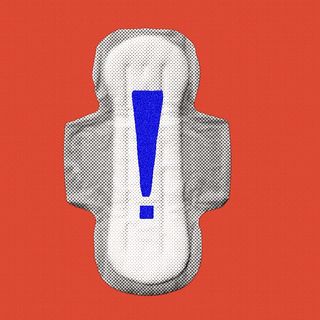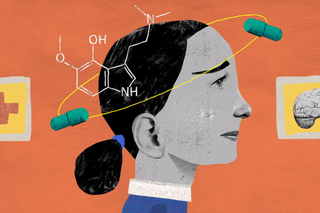
There’s Still No Scientific Consensus Linking Serotonin With Depression. Why Did the Theory Get So Popular?
“I believe we are in the phase of mental health care where we recognize that we may have to discard old findings, modify the existing ones and research newer possibilities.”

When I was diagnosed with clinical depression, it was important to have a chemical reason to hold on to. It made me disciplined and regimented about my illness: if this was like any other ailment, I would be good with my medication, and I would follow the instructions. Serotonin, a neurotransmitter called the “happy hormone,” was just then, in 2018, gaining popular currency on the internet. Surrendering to it allowed me to frame my illness as purely biochemical. It was an elegant, convenient explanation — and it worked. Importantly, it didn’t require me to plumb the depths of my psyche to figure out what was wrong with me
*
When in the middle of the 20th century, changes in serotonin levels became the leading theory to explain depression, the world changed forever. Blockbuster antidepressants became not only households names but also pop-culture fixations. Internet culture in the 21st century is replete with memes about serotonin and mental illness. There are even lifestyle hacks to boost serotonin in the brain. It has become, in short, shorthand for happiness.
But the “serotonin theory” of depression, as it’s been called, has been just that – a theory. Recently, psychiatry saw a major shake up when a meta analysis, published in Nature, concluded that none of the studies have conclusively linked low serotonin levels with depression. “The main areas of serotonin research provide no consistent evidence of there being an association between serotonin and depression, and no support for the hypothesis that depression is caused by lowered serotonin activity or concentrations,” the study said.
Shortly after this, however, scientists at the Imperial College London published a paper detailing evidence of a link between serotonin and depression based on brain scans. Still, other researchers – including those behind the meta-analysis – aren’t convinced.
Bijaya Biswal’s experience is a testament to the gaps in the theory. The serotonin explanation did not jive with her experience on selective serotonin reuptake inhibitors (SSRIs), which made her feel drowsy and led to suicidal ideation. She eventually discontinued her medication when it didn’t work – but not without facing additional stigma because of it.
“The ‘chemical dysfunction’ theory was so rigid at the time that people with depression who discontinued the medications were treated as the stereotypical ‘person with madness ignoring their medicines,’” she explains.
Related on The Swaddle:
How Serotonin Became the Internet’s Symbol for Hope and Happiness
Essentially, as Bijaya puts it, the perception was that “if you are discontinuing your medications by choice, you are choosing to remain depressed.”
Although she’s in a much better position now (and is on medication), she doesn’t attribute it to a “corrected” chemical imbalance but, rather, an overall change in functionality and life choices.
Almost all mental health practitioners argue that depression is complex: no two people’s depression looks the same, and it’s a combination of psycho-social and biochemical factors. And yet, serotonin has become immortalized in popular culture as the ultimate happiness chemical; the neurotransmitter that quantitatively explains someone’s mental state. The theory makes it easy to visualize mental illness as one would look at a video game character’s HP, where the HP is serotonin. Less of it is bad; more of it beams back a bright, reassuring green signifying life and health.
*
The serotonin theory has remained compelling for so long because the medication – based on serotonin – works. It’s been a process of reasoning backwards from there: if SSRIs provide relief, it must mean that serotonin relates to the cause.
The fact that this may not be the case simultaneously changes everything, and nothing. “With the new research… There is no Plan B. There is nothing else one can do to treat depression other than what we already have, which is evidence-based,” says psychiatrist Dr. Nahid Dave. “With serotonin becoming an almost-euphemism for joy now, several internet posts about the neurotransmitter serve a far more vital purpose – they are a coping mechanism,” The Swaddle noted earlier.
Believing in the serotonin theory is important: it restores people’s agency by implying that depression can be taken away.
“I believe what’s most important for me is to know that it’s not a choice, it’s not something I’ve caused,” says Aashna, 29.
Further, “When you give depression a biological theory, it reduces the stigma to a great extent, because it becomes like any other physical illness. So there’s more acceptability,” Dr. Dave says. Given the ambiguity of mental health, patients understanding what’s happening to them is very important – it’s often their sole motivation to take and continue treatment. Patients also want their dependents or guardians to know what’s happening, who may otherwise view depression as a personal weakness.
Many people tend to blame their own actions for their or their loved ones’ illnesses. “A lot of times people think ‘I should’ve, I could’ve, I must’ve,’ and parents go through a guilt trip when it comes to their kids.”
*
To be clear, antidepressants work. We just don’t know how or why.
As a mental health researcher and doctor, Bijaya has looked at the research closely: SSRIs may improve functionality but may not necessarily “correct” a chemical imbalance. Moreover, they have a high attrition rate – meaning that people stop taking them in large numbers.
“Diagnoses of mental health disorders are conceptualized on the basis of their “set of symptoms” and not any biomarkers,” Bijaya tells me. “Owing to this, the field is still developing, has a long way to go, and is neither understood nor can be explained accurately.”
“I believe we are in the phase of mental health care where we recognize that we may have to discard old findings, modify the existing ones and research newer possibilities,” says psychologist Safvana Khalid.
Related on The Swaddle:
There’s No ‘Depression Gene’ After All, Scientists Say
Resolving the debate of just how involved serotonin is in mental health is a crucial aspect of this phase. Serotonin is known to have birthed the field of neuroscience itself – without this reliable foundation to support it, we may be finding ourselves fumbling in the dark again. It’s not to say that existing treatments don’t work, but it does provide an opportunity to rethink the paradigm of mental illness itself.
The meta-analysis is a reiteration of what we already know – but it’s urgent enough to call for a reevaluation in how we approach mental health. Practitioners have always emphasized both biochemical and psycho-social models of mental health working in tandem. But in many contexts – especially in India, where mental health is still understood so poorly – the collaborative effort between psychologists and psychiatrists is minimal. That could change now, according to some.
“The concept of healing without addressing the biochemical aspect of depression could imply that therapists across the country can actively focus on factors outside of biology that can cause depression which may include systematic oppression based on gender, caste, class, family and in turn affect the biochemical nature of individuals,” Khalid says.
She also specifies that serotonin has been associated with a “wave” of therapies like behavioral therapy; but the new shifts in our understanding could pave the way for a new wave that includes “acceptance and commitment based therapies.”
Importantly, it allows us to adopt a broader view of mental health, removing it from an individualistic paradigm that, so far, oversimplified it. As Joanna Moncrieff, lead author of the meta-analysis argued: “mental health problems are not equivalent to physical, medical conditions and are more fruitfully viewed as problems of communities or societies.”
Rohitha Naraharisetty is a Senior Associate Editor at The Swaddle. She writes about the intersection of gender, caste, social movements, and pop culture. She can be found on Instagram at @rohitha_97 or on Twitter at @romimacaronii.
Related


Transgender Youth More Likely to Have Sleep Disorders: Study
